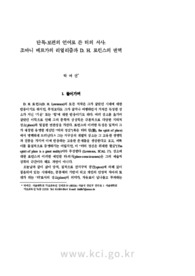

PARTNER
검증된 파트너 제휴사 자료
단독-보편의 언어로 쓴 터의 서사: 조바니 베르가의 리얼리즘과 D. H. 로런스의 번역 (The Narrative of Place in the Language of the Singular-Universal: Giovanni Verga's Realism and D. H. Lawrence's Translation)
29 페이지
최초등록일 2025.06.03
최종저작일
2024.12

-
미리보기
서지정보
· 발행기관 : 한국로렌스학회
· 수록지 정보 : D.H. 로렌스 연구 / 32권 / 85 ~ 113페이지
· 저자명 : 박여선
초록
Lawrence once said that we do not understand the Greeks and only translate them into another being. Rather than diminishing its achievement, this suggests translation’s importance as a means of penetrating the Other. This paper examines how Lawrence and Verga translate Italy’s ‘spirit of place’ into the singular-universalist language of their own narrative of place in resistance to modernism’s particular-generalist narrative of space.
As the middle-class Tuscan dialect came to dominate the unified Italy, the national literature alienated other regional idioms and threatened to write the harsh life of the provinces out of the collective consciousness. Verga’s creation of a narrative of Sicily can be seen as a critical response to this. As in England, so in Italy issues of geography were a question of politics and the creation of an art that gave aesthetic expression to alienated regions in the universal form of fiction was essentially political. In this context, Verga’s project is analogous to what Lawrence attempts in Sons and Lovers. Verga, however, had to face the more complicated problem of the Sicilian dialect. Translating the Sicilian of his peasants into the superficial bourgeois language of the time would destroy the communication of their intense, singular feelings, yet he needed to translate them into a more accessible language. Consequently, he has to invent a new dialect, and this is exactly what Lawrence in turn attempts in his subsequent English translations of Verga.
Both authors concentrate on the primitive passions of people rooted in place as the realization of the spirit of place. In both Verga’s and Lawrence’s ‘translations’, the singularity of this spirit survives the homogenizing forces of space which permeate modernity. The language they create is itself a means of creating the narrative of place, of Sicily and other places ‘in-between’.영어초록
Lawrence once said that we do not understand the Greeks and only translate them into another being. Rather than diminishing its achievement, this suggests translation’s importance as a means of penetrating the Other. This paper examines how Lawrence and Verga translate Italy’s ‘spirit of place’ into the singular-universalist language of their own narrative of place in resistance to modernism’s particular-generalist narrative of space.
As the middle-class Tuscan dialect came to dominate the unified Italy, the national literature alienated other regional idioms and threatened to write the harsh life of the provinces out of the collective consciousness. Verga’s creation of a narrative of Sicily can be seen as a critical response to this. As in England, so in Italy issues of geography were a question of politics and the creation of an art that gave aesthetic expression to alienated regions in the universal form of fiction was essentially political. In this context, Verga’s project is analogous to what Lawrence attempts in Sons and Lovers. Verga, however, had to face the more complicated problem of the Sicilian dialect. Translating the Sicilian of his peasants into the superficial bourgeois language of the time would destroy the communication of their intense, singular feelings, yet he needed to translate them into a more accessible language. Consequently, he has to invent a new dialect, and this is exactly what Lawrence in turn attempts in his subsequent English translations of Verga.
Both authors concentrate on the primitive passions of people rooted in place as the realization of the spirit of place. In both Verga’s and Lawrence’s ‘translations’, the singularity of this spirit survives the homogenizing forces of space which permeate modernity. The language they create is itself a means of creating the narrative of place, of Sicily and other places ‘in-between’.참고자료
· 없음태그
-
자주묻는질문의 답변을 확인해 주세요

꼭 알아주세요
-
자료의 정보 및 내용의 진실성에 대하여 해피캠퍼스는 보증하지 않으며, 해당 정보 및 게시물 저작권과 기타 법적 책임은 자료 등록자에게 있습니다.
자료 및 게시물 내용의 불법적 이용, 무단 전재∙배포는 금지되어 있습니다.
저작권침해, 명예훼손 등 분쟁 요소 발견 시 고객센터의 저작권침해 신고센터를 이용해 주시기 바랍니다. -
해피캠퍼스는 구매자와 판매자 모두가 만족하는 서비스가 되도록 노력하고 있으며, 아래의 4가지 자료환불 조건을 꼭 확인해주시기 바랍니다.
파일오류 중복자료 저작권 없음 설명과 실제 내용 불일치 파일의 다운로드가 제대로 되지 않거나 파일형식에 맞는 프로그램으로 정상 작동하지 않는 경우 다른 자료와 70% 이상 내용이 일치하는 경우 (중복임을 확인할 수 있는 근거 필요함) 인터넷의 다른 사이트, 연구기관, 학교, 서적 등의 자료를 도용한 경우 자료의 설명과 실제 자료의 내용이 일치하지 않는 경우
“D.H. 로렌스 연구”의 다른 논문도 확인해 보세요!
-
사랑과 성에 관한 몇 가지 고찰: 로런스와 바디우의 경우 24 페이지
This paper examines D. H. Lawrence’s thinking on sex and love in comparison with that of A. Badiou. The French philosopher urges us to re-invent love which has been reduced to a commodity in the capit.. -
쐐기풀이 된다는 것은 어떤 것인가?─로런스의 범심론적 계기에 관하여 25 페이지
This essay aims to compare Lawrence’s thoughts on the vitality of nonhuman beings with modern panpsychism, as articulated by Thomas Nagel, Galen Strawson, and partly, Christof Koch. These scholars, in..
문서 초안을 생성해주는 EasyAI
